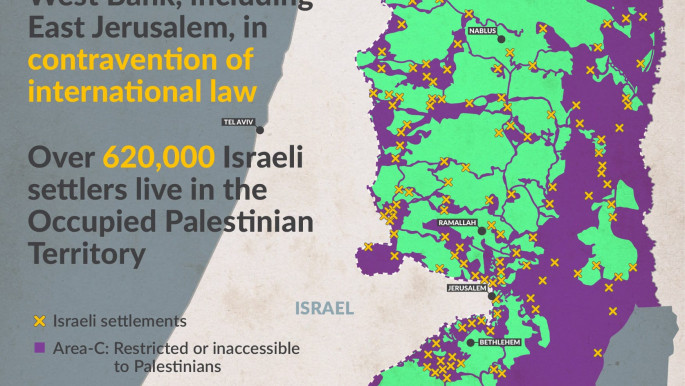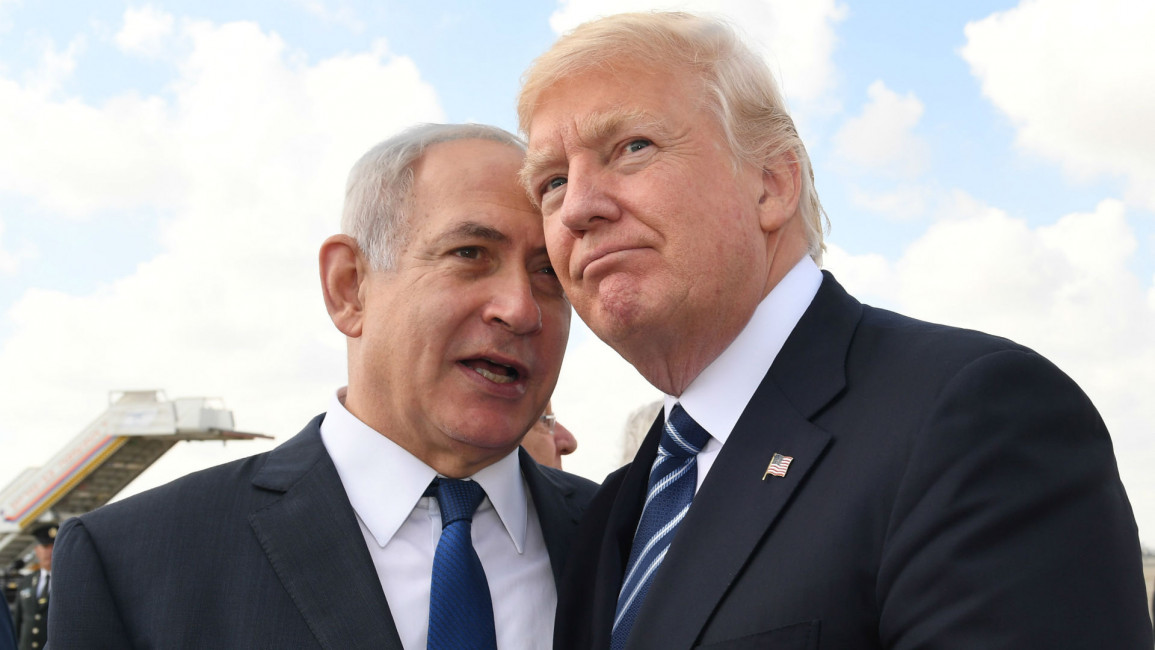Israeli Prime Minister Benjamin Netanyahu is using Donald Trump's internationally canned "Deal of the Century" so-called Middle East peace plan to entice pro-settler voters in an upcoming general election, as he chases a decisive win.
Donald Trump unveiled the plan while joined by Netanyahu at the White House, which envisions Israel annexing of one third of the occupied West Bank, including areas where illegal Jewish settlements are situated.
In a bid to move the needle in his favour, Netanyahu has spent the final weeks of the campaign handing out political gifts to different constituents, and the Trump plan has been the centrepiece of that strategy.
No deal
The plan would require Palestinians to make several impossible concessions, including abandoning the right of return - the bedrock of an internationally-recognised two-state solution.
Needless to say it has been condemned by Palestinian leaders, the United Nations, human rights organisations, and world leaders across the Middle East and Europe.
Amnesty International said the proposed deal violates international law.
Despite the Deal of the Century weighing heavily in Israel's favour, settlers are not convinced by Netanyahu as PM for another term.
"If there is something that undermines the stability of the campaign in Netanyahu's eyes, it is attacks from the right," the columnist Mati Tuchfeld wrote in the pro-Netanyahu daily Israel Hayom.
"It is not only the fate of Judea and Samaria that is on the line. His political fate is as well." Judea and Samaria is the biblical name Israelis use to refer to the occupied West Bank.
Israel heads to the polls for the third time in less than a year next Monday.
The previous two rounds ended in deadlock, with neither Netanyahu nor his challenger Benny Gantz able to secure a 61-seat parliamentary majority.
Pre-election polls show a similar impasse emerging from the next vote.
The election comes as Netanyahu faces corruption charges, with a trial set two weeks after the election.
 |
| Trump and Netanyahu [Getty] |
The Middle East plan was seen by critics as heavily favouring Israel.
Beyond granting Israel sovereignty over large parts of the occupied West Bank, it falls far short of the Palestinian dream of an independent state.
Instead, it calls for giving them limited autonomy over a disjointed archipelago of land, and only if they meet a stringent set of demands.
Seeing the plan as a green light, Netanyahu quickly pledged to steam ahead with annexation.
But a cabinet meeting announced by his office never convened, with Netanyahu apparently reined in by officials at the White House who balked at his premature zeal.
Netanyahu has since tempered expectations on his annexation vow, fending off attacks from hard-liners by saying he must first map the territory with the Americans.
"We don't want to risk this. We are working responsibly and rationally," Netanyahu told his Cabinet earlier this month.
"To all those chirping in from outside and even from within the government: We did the work, we will complete the work."
More settlement plans
Netanyahu announced plans on Thursday to build thousands of new homes for Israeli settlers in occupied East Jerusalem, a project unveiled less than two weeks before a general election.
"I have huge news today - we're adding another 2,200 units to Har Homa," Netanyahu said in a video message posted by his office.
 |
The contentious Har Homa community was first built in 1997, during a previous Netanyahu government.
The prime minister said he had approved that initial construction "despite objections from the entire world" and estimated that Har Homa's population would grow from 40,000 to 50,000 when the new units were completed.
Netanyahu also announced approval to build a new settlement with several thousands homes in Givat Hamatos, next to the mainly Palestinian East Jerusalem neighbourhood of Beit Safafa.
The new community will include 3,000 homes for Jewish-Israeli residents and 1,000 "for the Arab residents of Beit Safafa", Netanyahu said.
Read More: Anger on the streets: Israeli deals and relations 'outrightly rejected' by Jordanians
Trump's vision, with its tacit approval of Israel's settlements, sparked feverish calls from settlers for Israel to immediately annex parts of the West Bank.
This includes more than 120 settlements, home to nearly 500,000 Israelis.
Netanyahu's about-face has triggered a backlash among settler leaders, including some within his own party.
Settlers have erected a protest tent outside Netanyahu’s Jerusalem office, and have staged protests and been outspoken in their criticism.
"Israel should impose sovereignty even if America doesn’t agree," said Yossi Dagan, a settler leader who has led the charge for annexation and is also an influential activist in Netanyahu’s Likud Party.
"This was a mistake and the prime minister must correct it."
Netanyahu's enthusiasm for the plan has drawn criticism from even more hard-line settler supporters who believe it doesn't go far enough.
Although they support the annexation plans, they oppose the establishment of the limited Palestinian state and the proposed creation of settlement "enclaves" surrounded by Palestinian territory.
They believe the creation of a Palestinian state — even in its weakened form — endangers Israel in the long term.



